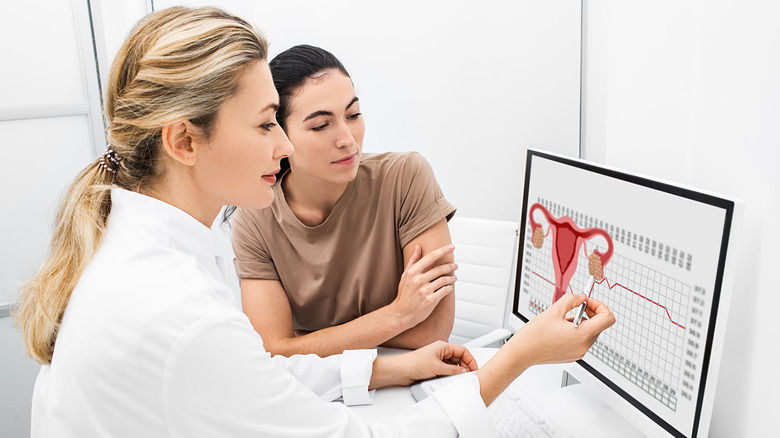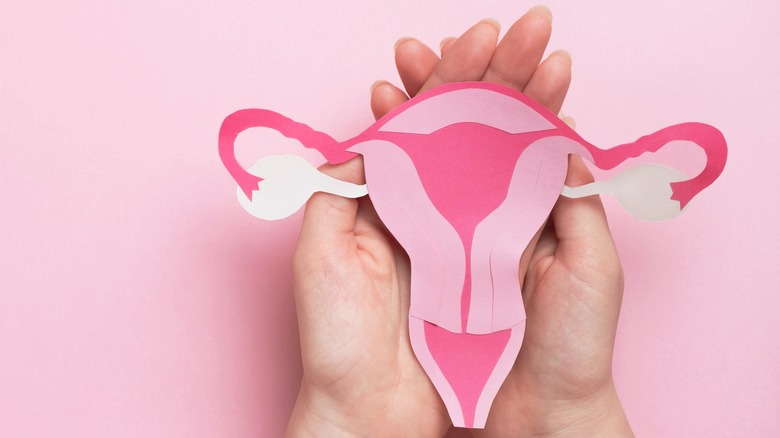Everything You Need To Know About Oligomenorrhea
The thought of missing your periods may be a little gladdening, considering the painful cramps, nausea, and mood swings they come with (per WebMD). However, it may also be worrying if you're sexually active, as that may indicate the possibility of you being pregnant. Moreover, missed or delayed periods could signal many other health conditions, such as polycystic ovary syndrome, and serious issues like congenital adrenal hyperplasia, Asherman's syndrome, and Cushing syndrome. If you're a person with illnesses like obesity, bulimia, hyperthyroidism, anorexia nervosa, hypothyroidism, and diabetes, or you're on birth control, missing periods may not be too alarming for you as these factors contribute greatly to having irregular periods (via Healthline).
Another likely reason why you didn't get your period within the last 35 days, as you normally should, may be a condition known as oligomenorrhea, according to the Cleveland Clinic. This happens when you have unpredictable and inconsistent periods. While the condition is often caused by various uncontrollable factors, there are also instances where normal activities (exercise, for instance) can promote this condition. And knowing the condition well and in terms of what causes it — risk factors and the effective treatment options at your disposal — can help save you from the worry and anxiety as well as the nasty symptoms it comes with. Let's take a look at what you need to know about oligomenorrhea to equip you enough to handle it.
What causes oligomenorrhea
The most common causes of oligomenorrhea include eating issues like bulimia (where people who overeat follow that up with purging and extended fasting periods) and anorexia nervosa (the desire for food goes low and leads to weight loss), chronic health issues like hyperthyroidism (when your thyroid produces too much thyroid hormone), hypothyroidism (your body produces too little thyroid hormone), obesity, and premature ovarian insufficiency, according to Healthline. Beginning with eating problems, experiencing drastic weight loss may affect the regular occurrence of your periods as it impacts one of the main players in normal period occurrence: Body fat. Estrogen seeks shelter in body fat for future use, and when body fat is low, there may be a low amount of estrogen available too — and this makes it impossible to kickstart the ovulation process (per Fertility SA).
On the flip side, when you have high body fat (with the main cause for the weight being obesity), your estrogen levels become too high and end up causing a negative effect on your periods. In some cases, they may halt your periods completely. Hyperthyroidism and hypothyroidism affect the thyroid, which manages the metabolism process in your body and affects certain hormones including estrogen. Thyroid production levels have to be just right for the metabolism management function to run smoothly. When there are very low or high quantities of the thyroid hormone, your periods may become extremely heavy, too light, or inconsistent (via the Office on Women's Health).
Popular symptoms of the condition
According to Healthline, the most obvious symptom of oligomenorrhea is having hard-to-predict periods. When the periods occur in one month and don't in the other, that may indicate oligomenorrhea. The Cleveland Clinic also suggests that when you begin experiencing extreme unexpected warmth around your chest, neck, and face, and having headaches, abdominal pain, acne, poor eyesight, having white or clear watery (or sometimes sticky) fluid coming out of your vagina, and noting unusual growth of hair on your body and face, you may want to visit your doctor to see if you have oligomenorrhea.
Other possible symptoms may include only having your periods nine times or less within a period of 12 months, feeble bones that crack or break easily, and extreme bleeding when your periods come. Women who are heavily involved in sports tend to have high chances of developing oligomenorrhea due to the nature of their activities and habits. For these women, some of the symptoms that may signal the condition include hypotension, having bones around the spine, hips, and the bottom side of the leg break or crack, and having irregular heartbeat patterns. Some may also notice they feel limited in terms of what they can eat as some foods may not sit well with them — and their eating habits may also get affected (per Find a Top Doc).
Moreover, the National Library of Medicine adds that there may be low sex urge, along with changes in your skin, bowels movements, and in the pitch of your voice, if you have oligomenorrhea.
Oligomenorrhea may be a symptom of an underlying condition
While oligomenorrhea is an entire condition on its known, there are times when it may act as an indicator of another illness. WebMD explains that health issues that have oligomenorrhea as a symptom include Cushing Syndrome — a condition linked to excess production of cortisol — the stress hormone. Sometimes, your body may naturally produce the hormone in high quantities — and other times, medications may be responsible. A study published in The Journal of Clinical Endocrinology & Metabolism found that eight in every 10 participants with Cushing Syndrome had unstable periods, and serum cortisol was the cause.
Another condition linked to irregular periods is prolactinoma. This is where you get a non-cancer tumor which pushes your pituitary gland (a pea-like gland at the bottom of your brain which regulates endocrine functions as well as growth and development) to produce more prolactin (the hormone that helps women who've given birth to have milk for their babies) than required in the body. Another study published in the Indian Journal of Endocrinology and Metabolism reveals that people with prolactinoma tend to experience oligomenorrhea more often (at a rate of almost 78%). Other health issues where patients get oligomenorrhea a lot include Asherman's syndrome, pelvic inflammatory disease, primary ovarian syndrome, congenital adrenal hyperplasia, major eating disorders (including binge eating), and polycystic ovary syndrome (via WebMD).
Diagnosis
When it comes to diagnosing oligomenorrhea, your doctor follows a series of steps to understand your condition and determine the possible causes of the infrequent bleeding so they can understand the best approach to handle your case. As the doctor does the diagnosis, they may need you to paint a clear picture of your issue. They'll want to know when it started and how it's been progressing through the years. If you can point out a common pattern you've noticed, for example, that can be helpful for your doctor. Having a good understanding of how the condition occurs in terms of the average blood amount you normally lose, how often you get it, when you get it, and for how long it stays when it comes, can be useful information. The doctor may also want to know more about your overall health in terms of any previous short-term health issues you've had as well as any chronic conditions like diabetes mellitus (per the Encyclopedia of Children's Health).
Mfine also mentions that the doctor may be curious to know if any female family members or relatives like a grandmother, mother, aunts, or sisters have had the same bleeding experience — this gives them insight into whether or not genes are playing an active role in your condition. Moreover, you're also going to need to share information about your pregnancy experiences, sex life, and any surgeries you've had. Information about your eating habits and how you work with contraception can also go a long way in making the diagnosis rewarding (via the Encyclopedia of Children's Health).
Common tests and examinations during oligomenorrhea diagnosis
After having a discussion with the doctor about your health issue, they may recommend several tests and examinations to get to the root of the problem. The Cleveland Clinic lists some common tests which include a physical exam, rectovaginal exam, vaginal speculum exam, and abdominal exam. During a physical exam, your doctor will assess your face, abdomen, breasts, and neck to see if there are any pointers to oligomenorrhea. As for the rectovaginal exam, your doctor aims to look for masses in your rectum and vagina. So, don't get surprised if they tell you that they'll be gently penetrating both areas with gloved fingers.
The vaginal speculum exam involves increasing the doctor's view of your vagina using a speculum — a medical tool that gently stretches the vagina. Here, the doctor looks for evidence of infection, scar tissue, and inflammation. Lastly, the abdominal test aims to determine any abnormalities such as soft areas and masses in the abdomen. Regarding tests, the doctor will want to know how much blood sugar is in your body as well as levels of hormones like the luteinizing hormone, thyroid-stimulating hormone, prolactin, follicle-stimulating hormone, and 17-OHP. Some imaging tests like CT scans, MRIs, and ultrasounds may also get added to your diagnosis.
The National Library of Medicine also notes that an overnight dexamethasone suppression test that seeks to determine if Cushing syndrome is the reason for your oligomenorrhea is a possibility too.
Similarities and differences between oligomenorrhea and amenorrhea
Amenorrhea — a condition that's highlighted by not getting your periods at all — is often confused with oligomenorrhea, although the two reproductive issues are quite different. According to the Cleveland Clinic, amenorrhea comes in two types: primary amenorrhea (where you're late on your first period even after hitting the adolescent stage and becoming sexually mature) and secondary amenorrhea (where periods have been coming as usual but you miss them suddenly for around 90 days or first having infrequent periods followed by sudden period cessation for about 180 days).
One of the ways that amenorrhea is similar to oligomenorrhea is in most of the possible causes. Genetic and hormonal issues, stress, existing illnesses, weight, and fitness activities, just like oligomenorrhea, tend to bring about amenorrhea. Two other aspects that both amenorrhea and oligomenorrhea are the same are the symptoms and diagnosis. When it comes to the differences, in oligomenorrhea, the periods are there but they come in an irregular fashion while in amenorrhea they go away (either for several months or entirely). Secondly, amenorrhea can come about due to some absent reproductive parts like the vagina, uterus, or even cervix, which is not the case with oligomenorrhea (per the Mayo Clinic).
Oligomenorrhea, ovulation, and pregnancy
Having unstable periods may make getting pregnant a hectic process for you if you're trying to conceive in the near future. And while, periods appear differently almost every time for each woman (in terms of delayed occurrence and the accompanying symptoms), women with unpredictable periods can have more trouble planning for a child than the average woman. In essence, when you have oligomenorrhea, your ovulation — the process where ovules or eggs get released from the ovary — affects your periods and when the ovulation isn't predictable, the period patterns become difficult to project too. This makes it more daunting to time your ovulation well so you can become pregnant (via Banner Health).
The good news is, there are several adjustments you can make such as reducing and avoiding stressful thoughts and situations (for those whose periods get affected by stress) to gain more control of your periods, and therefore make conception more likely to happen sooner. For other causes, you can choose to pursue treatment to enhance the regularity of your periods as you're trying for a child. To determine if medical treatments are an option, you need to consider your age and the time span you've been trying to get pregnant. If you've been trying for a year and you're below 35 years, or half a year and you're above 35 years, that's your cue to talk to your doctor about available treatments. The same case applies to women above 40 years. Your doctor may discuss medications like clomiphene to increase ovulation. "Clomiphene induces ovulation in most women with anovulation. Up to 10% of women who use clomiphene for infertility will have a multiple gestation pregnancy — usually twins" (per WebMD).
Surgical treatment for oligomenorrhea
After your doctor determines the exact reason why you're getting your periods abnormally, they'll proceed to offer you the treatment options available to deal with the specific cause. Surgery is one of the possible options depending on your case. The National Library of Medicine notes that if you have hyperthyroidism, a surgery known as thyroidectomy could be your best fit. Also, if there are adrenal or adnexal tumors found or you have an overly huge prolactinoma that's causing compressive symptoms in your body, the most effective solution would be surgery.
When it comes to thyroidectomy, the doctor takes away a section or the entire thyroid gland found in the foremost part of your neck. Johns Hopkins Medicine explains that two types of thyroidectomy exist: traditional thyroidectomy (which involves taking away one or two of the thyroid gland lobes together with any infected lymph nodes around that area) and scarless thyroidectomy (which involves approaching the thyroid gland orally instead of making incisions on your neck like traditional thyroidectomy).
For adrenal tumors, there are three types of surgical options: open surgery (which works best for huge tumors or those with cancer, and it involves making incisions), minimally invasive surgery (which involves 3D visualization using a camera to see the entire area getting operated) and cryoablation (which aims to freeze and shatter the tumors with the help of computed tomography scans), according to the Mayo Clinic.
Non-surgical oligomenorrhea interventions
If your case doesn't require surgery, your doctor may recommend several non-surgical treatment options like hormone therapy. Hormone therapy helps to bring balance to your hormones which will in turn help stabilize your periods (per WebMD). Here, you're given contraceptives that you should take by mouth, which contain two common hormones — progesterone and estrogen — which have links to your periods. Progestin is among the common medications for balancing hormones that help with abnormal periods. Also, if you have been using an IUD (Intrauterine device), Depo-Provera, or Nexplanon as part of your contraception plan, the doctor may ask you to consider other contraceptive options like cervical cap, birth control patch, or tubal ligation, according to another article on WebMD. If you get involved in too many fitness exercises, you should consider reducing the intensity and frequency of the exercises. Moreover, if stress is the cause of your period problems, you can seek the help of a counselor to determine the cause of stress and the best remedies for it.
Children's Hospital Colorado also suggests other hormone therapy options like norethindrone acetate. Although it takes a while before you notice effective results, the oral drug can really help you control your bleeding and help your periods go back to being normal. You take the medication every day around the same time (that is, if you take them today at noon, you should have them tomorrow at noon too). "Depending on how the medicine is used and how a girl responds to it, periods can be stopped or scheduled every 3-4 months. It may take several months of using the medicine until bleeding is fully regulated" (via Children's Hospital Colorado).
Home remedies
If you're a fan of home remedies, you can relieve the symptoms of oligomenorrhea through various natural interventions based on your cause. For starters, working toward and maintaining moderate weight can help. If you have slightly more weight or too little weight, consider working your way toward the sweet spot of moderation since both extremes can throw your periods off balance (per Healthline). Yoga has also proven to be effective in minimizing cramps, swelling, and improve overall physical performance, according to the International Journal of Environmental Research and Public Health.
Moreover, the Journal of Alternative and Complementary Medicine adds that a specific form of yoga known as Yoga Nidra can regulate hormones linked to menstrual issues that come with various health conditions including oligomenorrhea. Healthline further notes that common ingredients in your kitchen like ginger, cinnamon, and apple cider vinegar can come in handy for you. Although ginger doesn't handle all oligomenorrhea symptoms and isn't always effective, it may tone down the common period-related pain, and can also boost your moods and cut down the amount of blood that flows as you menstruate. Cinnamon may also regulate bleeding, vomiting, nausea, and pain linked to periods.
The Tohoku Journal of Experimental Medicine points out that taking vinegar-based beverages can enhance your insulin responsiveness if you have polycystic ovary syndrome and, in turn, improve how your body releases ova from your ovaries. Eating pineapples may also solve menstrual problems as it has an enzyme called Bromelain that may modulate periods and "soften" your uterus's lining (via Healthline).
Long-term risks and complications
Medical News Today notes that when left unattended, irregular periods may increase the likelihood of the occurrence of other illnesses such as osteoporosis — where your bones become weakened and easily breakable. This happens because of a low amount of estrogen hormone. The ovulation process increases estrogen levels in your body, so, when you don't ovulate, you have low levels of estrogen which brings you close to osteoporosis. "Similarly, a lack of estrogen can raise the risk of cardiovascular disease" (via Medical News Today). Also, you may have a hard time trying to conceive as your body is having a hard time producing eggs.
Additionally, unstable periods may also cause the lining of your uterus to thicken and cause a condition known as endometrial hyperplasia. And this condition puts you on the edge of developing endometrial cancer. Plus, if you experience heavy bleeding (when the periods come), you may lose a lot of blood and the iron in your body may reduce as it leaves your body through the blood. This may bring about a condition called iron deficiency anemia. Research also suggest that oligomenorrhea increases the possibility of developing type 2 diabetes mellitus, and this risk exists whether you have obesity or not (per the JAMA Network).












